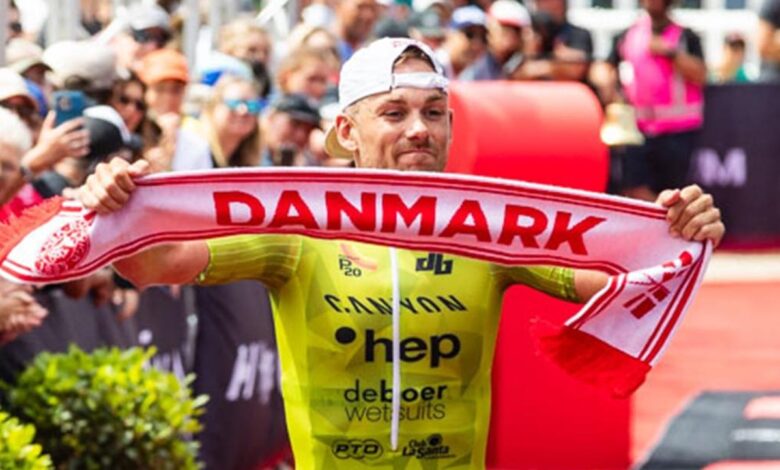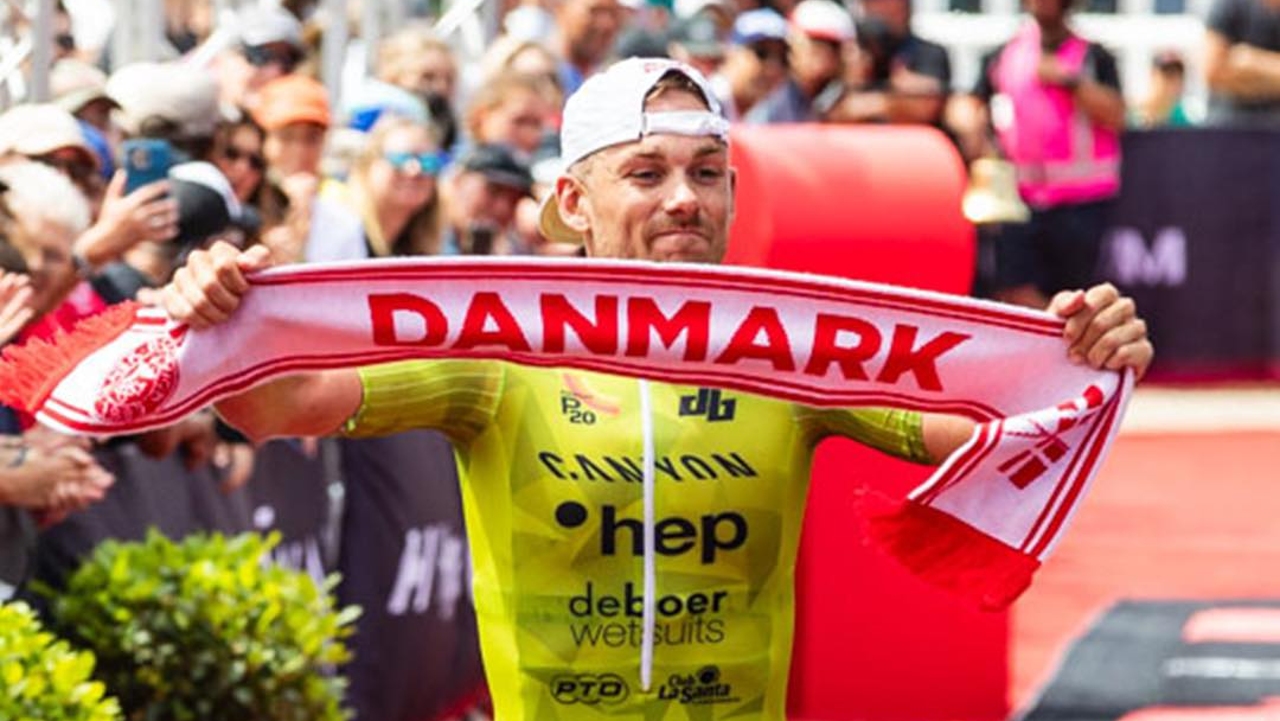Daniel Bækkegård on fighting back, fighting for clean water, and an Olympics triathlon ‘s***show’

The emotions were flowing for Daniel Bækkegård when he notched his first podium of the season at T100 London recently and we’ve been catching up with him to find out why the race was so important on a number of levels.
It was a return to form after a testing few months, with the lessons learned hopefully standing him in good stead for not just the remainder of this season but also the rest of his career and beyond.
And it also marked the launch of a venture close to his heart which is putting the spotlight on water quality – on an even more fundamental level than all those headlines which came soon after at the Paris 2024 Olympics, albeit inextricably linked. Much more on that later…
Changing landscape
The Danish star is currently number 11 in the PTO’s world rankings and the former elite swimmer has consistently been around the top 10 over the last few years.
He looked to have teed up 2024 perfectly with victory at IRONMAN Western Australia last December but things then didn’t follow the script, with eighth in his season-opener at T100 Miami followed by DNFs at T100 Singapore, 70.3 Switzerland and Challenge Roth.

The last of which was particularly frustrating after he’d worked his way back to full fitness only to be undone by an unlucky bike crash.
So it was no wonder that his third place behind reigning IRONMAN World Champion Sam Laidlow in London meant so much.
Looking back now he’s says the adversity leading up to that will help him in the future – and reckons he won’t be the only athlete to face similar challenges with so many more opportunities now on offer with the advent of the T100 Series and the IRONMAN Pro Series.
While he absolutely welcomes the changing landscape, he told us that it’s still a work in progress balancing everything out: “I think the sport changing so fast and so quickly with the new formats coming in – and it requires something else from athletes.
“When you plan how the new season is supposed to look, you have ideas on how to tackle it. Sometimes you hit it correctly, sometimes you are unfortunate – and also, you may just miss the target completely.”
Long-term gains
The biggest challenge for Bækkegård was managing a back issue: “You could say I was unlucky in some aspects such as getting a back injury and still trying to carry on with training. But I didn’t feel like I had time to take a step back and actually address it properly. And that just resulted in basically Miami and Singapore being a disappointment.
“But looking back, obviously I learned a whole lot from that. It’s a tough situation to be in. But when I came home to Europe, we just took, like ten steps back and started from scratch.
“And then we saw what happened in London. I’d really put the work in – it’s not really the sexy type of training you actually want to be doing, but it’s also about having kind of a longevity in sports and knowing that your career will be way longer than only this season.
“And to be honest, it was a tough way of realising how bad my body actually was at that point.
“I’ve learned a lot in terms of being patient and doing the right stuff at the right time. And I think, and that just calls for a great second half of the season and hopefully also knowing a bit more in terms of how to tackle the upcoming years.”
He also learned a huge amount from a training block in Australia in between Miami and Singapore, praising the incredible triathlon community in Noosa, a place he’s keen to go back to.
“I think for any athlete who has the opportunity to do stuff like that, they should definitely do it because you’ll get so much knowledge that you can bring to your rest of your career.
“And not just your pro career, but also afterwards because you can talk to so many athletes who are former athletes who retired.
I think it’s very important to actually also know how to manage yourself afterwards and how to set yourself up for a good life.
Making a difference
But back to the other key aspect of T100 London where a partnership was formally announced which aims to bring clean water to an estimated 10,000 people over the next year through the installation of solar powered water infrastructure in underserved communities.
That is between deboer, one of Bækkegård’s sponsors, and Relate Water, a non-profit social enterprise.
The initiative is aimed at providing clean, accessible water to rural South African villages, with deboer commiting 1% of its monthly turnover to Relate Water.
And while that puts many things in perspective, Bækkegård hopes the initiative galvanises triathlon as a whole to tackle many of its own water quality issues.
For just days after that T100 London launch, the build-up to the Paris Olympics – the sport’s biggest showpiece – was dominated by the challenges of getting the River Seine safe for the triathletes to swim in.
All the days set aside for familiarisation swims were cancelled and the men’s race was postponed by over 24 hours, though all did eventually take place.
It’s a fundamental challenge for the sport and one that Bækkegård says it needs to address.
He told us: “Living in Denmark, we are surrounded by water, and it’s been part of my life for as long as I can remember.
“I’ve always done open water swimming and it’s been great for many years. And then all of a sudden in certain places, it really isn’t anymore because there’s no life in the water. Everything is dead.
“If we can feel the change in Denmark, a place where I’m still fortunate to actually be able to swim in open water, then you can see why it’s not possible at all in certain places when you start travelling around the world.
“And that’s why I became very enthusiastic about making, or trying to make, a difference with Relate Water in terms of getting better water quality to places where having good drinking water is not something they just grew up with like us.
“My thought around it is that if we can see the change in a very privileged place like Denmark, then obviously they can feel it way worse.
“It’s been great that deboer have actually started this project in South Africa. I was talking to the guys and in the first year, they were expecting to be able to help around 10,000 people; it’s a very good start. Obviously, I hope that we can grow it.”
Paris 2024 s***show
And returning to the issues facing triathlon, Bækkegård has had personal experience of the challenges: “We’ve had instances the last couple of years – I learned it the hard way in Singapore [in 2023] where we had some troubles.
“And also you could see it in Paris with the Olympics. We have to take care of it because [otherwise] it will get worse and worse. What can we actually do to improve the places we go racing?
“Because it is triathlon, it’s not duathlon. If we’re not taking care of it, then it will be duathlon almost every time we go racing in some places in the future.
“I think it was just massively disappointing to see it in Paris, to be honest. Imagine having athletes who are spending their whole life getting to the Olympics, and then there’s a s***show like that. I can only imagine how I would feel about it.”
In the second part of the interview we’ll focus on Daniel’s big targets for the rest of the season, why he thinks the T100 has been a game-changer, hear why Kona isn’t quite as special as it once was – and how he hopes to inspire the next generation.


